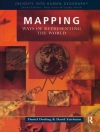As digital technologies have become part of everyday life, mediating tasks such as work, travel, consumption, production, and leisure, they are having increasingly profound effects on phenomena that are of immediate concern to geographers. These include: the production of space, spatiality and mobilities; the processes, practices, and forms of mapping; the contours of spatial knowledge and imaginaries; and, the formation and enactment of spatial knowledge politics Similarly, there are distinct geographies of digital media such as those of the internet, games, and social media that have become indispensable to geographic practice and scholarship across sub-disciplines, regardless of conceptual approach.
This textbook presents a fully up-to-date, synoptic and critical overview of how digital devices, logics, methods, etc are transforming geography. It is divided into six inter-related sections
- introduction to digital geographies
- digital spaces
- digital methods
- digital cultures
- digital economies
- digital politics
With illustrious instructors and researchers contributing to every chapter, Digital Geographies is the ideal textbook for courses concerning digital geographies, digital and new media and Internet communications, and the spatial knowledge of politics.
Table des matières
Chapter 1 Introducing Digital Geographies – James Ash, Rob Kitchin and Agnieszka Leszczynski
PART 1 Digital Spaces
Chapter 2 Spatialities – Agnieszka Leszczynski
Chapter 3 Urban – Andres Luque-Ayala
Chapter 4 Rural – Martin Dodge
Chapter 5 Mapping – Matthew W Wilson
Chapter 6 Mobilities – Tim Schwanen
PART 2 Digital Methods
Chapter 7 Epistemologies – Jim Thatcher
Chapter 8 Data and Data Infrastructures – Rob Kitchin and Tracey Lauriault
Chapter 9 Qualitative Methods and Geohumanities – Meghan Cope
Chapter 10 Participatory Methods and Citizen Science – Hilary Geoghegan
Chapter 11 Cartography and Geographic Information Systems – David O’Sullivan
Chapter 12 Statistics, Modelling and Data Science – Daniel Arribas-Bel
PART 3 Digital Cultures
Chapter 13 Media and Popular Culture – James Ash
Chapter 14 Subject/ivities – Sam Kinsley
Chapter 15 Representation and Mediation – Gillian Rose
PART 4 Digtial Economies
Chapter 16 Labour – Mark Graham and Mohammad Anwar
Chapter 17 Industries – Matt Zook
Chapter 18 Sharing Economy – Lizzie Richardson
Chapter 19 Traditional Industries – Bruno Moriset
PART 5 Digital Politics
Chapter 20 Development – Dorothea Kleine
Chapter 21 Governance – Rob Kitchin
Chapter 22 Civics – Taylor Shelton
Chapter 23 Ethics – Linnet Taylor
Chapter 24 Knowledge Politics – Jason C Young
Chapter 25 Geopolitics – Jeremy Crampton
A propos de l’auteur
Agnieszka Leszczynski is a Lecturer in the School of Environment at the University of Auckland, New Zealand. Her work is situated at the subdisciplinary interfaces of GIScience and human geography and examines issues around geospatial technologies and critical GIScience. She has published a range of articles in leading Geography journals including Progress in Human Geography and Environment and Planning D: Society and Space.












